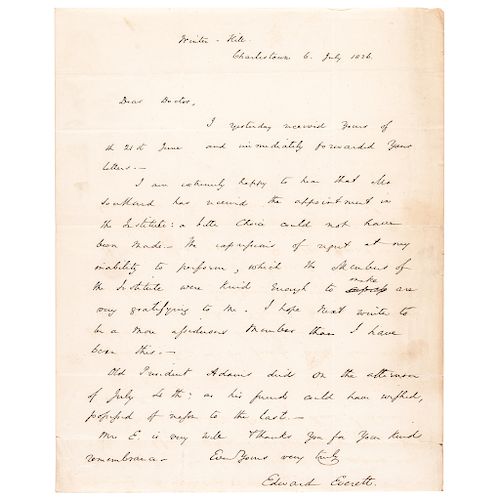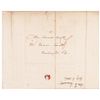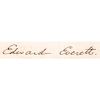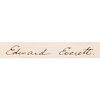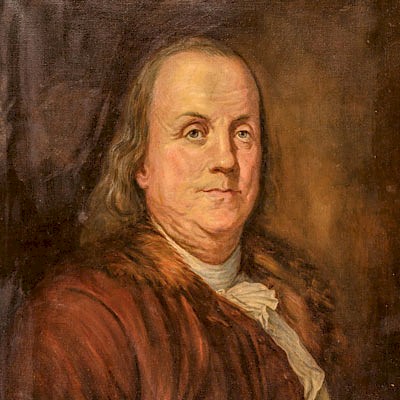July 6, 1826 EDWARD EVERETT's Letter Reports on JOHN ADAMS Death on July 4th!
Lot 31
Estimate:
$4,000 - $5,000
Absentee vs Live bid
Two ways to bid:
- Leave a max absentee bid and the platform will bid on your behalf up to your maximum bid during the live auction.
- Bid live during the auction and your bids will be submitted real-time to the auctioneer.
Bid Increments
| Price | Bid Increment |
|---|---|
| $0 | $10 |
| $200 | $20 |
| $300 | $25 |
| $500 | $50 |
| $1,000 | $100 |
| $2,000 | $200 |
| $3,000 | $250 |
| $5,000 | $500 |
| $10,000 | $1,000 |
| $20,000 | $2,000 |
| $30,000 | $2,500 |
| $50,000 | $5,000 |
| $100,000 | $10,000 |
| $200,000 | $20,000 |
| $300,000 | $25,000 |
| $500,000 | $50,000 |
About Auction
By Early American History Auctions
Aug 24, 2019
Set Reminder
2019-08-24 12:00:00
2019-08-24 12:00:00
America/New_York
Bidsquare
Bidsquare : Autographs, Colonial Currency, Political Americana, Historic Guns
https://www.bidsquare.com/auctions/early-american-history-auctions/autographs-colonial-currency-political-americana-historic-guns-4347
Historic Autographs • Colonial Currency • American Civil War Colonial Era • Revolutionary War • Political Americana • Black History Early American History Auctions auctions@earlyamerican.com
Historic Autographs • Colonial Currency • American Civil War Colonial Era • Revolutionary War • Political Americana • Black History Early American History Auctions auctions@earlyamerican.com
- Lot Description
Autographs
Remarkable Letter July 6, 1826 where EDWARD EVERETT Relays the News of JOHN ADAMS Death on July 4th - A !
EDWARD EVERETT (1794-1865). American politician, pastor, educator, diplomat, and orator from Massachusetts, he served as U.S. Representative, U.S. Senator, the 15th Governor of Massachusetts, Minister to Great Britain, and United States Secretary of State, and Harvard University President. A great American Orator remembered for the dedication ceremony of the Gettysburg National Cemetery in 1863, where he spoke for over two hours before President Abraham Lincoln delivered his famous two-minute Gettysburg Address.
July 6, 1826-Dated, Important Content Autograph Letter Signed, "Edward Everett" at Charlestown (Massachusetts), 1 page, measuring about 9.75" tall x 7.75" wide, with "Free" Franked Handwritten Integral Address Panel by Everett, Choice Very Fine. The postal Address Panel reads, in full: "Free. - Edward Everett - Dr Thomas Sewall - Washington City." and has a round red postal date-stamp "BOSTON - JUN 6 - MS", along with a docket on the outer edge panel "Hon. E. Everett - July 6 1826". Typical transmittal folds, boldly penned in rich deep brown ink and signed twice "Edward Everett" in the FREE Frank and at the conclusion of this Letter which is on clean "S & A BUTLER - US" watermarked period wove paper.
This truly remarkable original historic Letter written and signed by Edward Everett, is to the noted Doctor Thomas Sewall in Washington City (DC), in which Everett sends a reply to prior correspondence and, most importantly, notifies Dr. Sewall that President John Adams had died on July 4th, being just two days prior. As previous "Founding Fathers" and comrades in the Revolutionary War era fight for the United States' Independence from Britain, then as later political rivals, and finally aging newly rejoined friends, the Death of both President JOHN ADAMS and President THOMAS JEFFERSON was extraordinary miraculously occurring on the exact same day, July 4th, 1826, being on the 50th Anniversary of the Signing of the DECLARATION OF INDEPENDENCE on JULY 4, 1776 is considered to be one of the remarkable most "Romantic" ends to the historic "American Revolutionary" generation. This Amazing Content personal Letter reads, in full:
"Winter - Hill Charlestown 6. July 1826.
Dear Doctor, --
I yesterday received yours (letter) of the 21st June and immediately forwarded your letters. - I am extremely happy to hear that Mr Southland has received the appointment in the Institute: a better Choice could not have been made. - The capacious (sizable) of regret at my inability to perform, which the Members of the Institute were Kind Enough to make are very gratifying to me. I hope next write to be a more assiduous Member than I have been thus. -
Old President Adams died on the afternoon of July 4th; as his friends could have wished, possessed of valor to the Last. -
Mrs. E. (Everett) is very well - Thank you for your kind remembrance. - Ever Yours very truly -- (Signed) Edward Everett."
Dr. Thomas Sewall (1786-1845) was an American doctor, writer and academic. He gained notoriety for being convicted of "body snatching," and later went on to become a professor. In August 1812, he graduated from Harvard Medical School and began practicing medicine. In 1819, he was arrested, charged, and found guilty of multiple counts of body snatching in Ipswich, Massachusetts. Forced to leave the state, he moved to Washington City to re-establish his career. In 1825 he became a founding faculty member of the Medical Department at Columbian College (which later became George Washington University), where he became a Professor of Anatomy.
Dr. Thomas Sewall (April 16, 1786 - April 10, 1845) was an American doctor, writer and academic. He gained notoriety for being convicted of body snatching, and later went on to become a professor.
Sewall was born in Hallowell, Maine. In August 1812, he graduated from Harvard Medical School and began practicing medicine. In 1819, he was arrested, charged, and found guilty of multiple counts of body snatching in Ipswich, Massachusetts. Forced to leave the state, he moved to Washington City to re-establish his career. In 1825 he became a founding faculty member of the medical department at Columbian College (which later became George Washington University), where he became a professor of anatomy.
Sewell is remembered today for his eight graphic drawings of "alcohol diseased stomachs." Colored lithographs of these were made and widely distributed to promote teetotalism and the temperance movement. He was also an opponent of phrenology, the pseudo-science of studying the size and shape of peoples' heads.
- Shipping Info
-
Early American provides in-house worldwide shipping. Please contact us directly if you have questions about your specific shipping requirements.
-
- Buyer's Premium



 EUR
EUR CAD
CAD AUD
AUD GBP
GBP MXN
MXN HKD
HKD CNY
CNY MYR
MYR SEK
SEK SGD
SGD CHF
CHF THB
THB